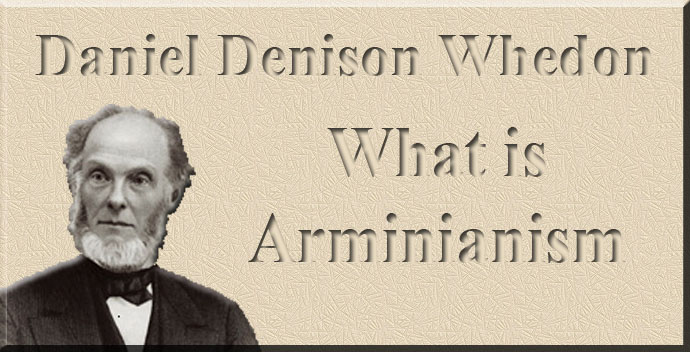
What is Arminianism
By Daniel Denison Whedon
Introduction
|
It is frequently claimed that the controversy between Calvinism and Arminianism is a dead issue, handed down from a past age; and that the questions in dispute belong to the realm of philosophy, rather than to practical theology. There is good ground to question the correctness of this allegation. If the matter in dispute be a question of philosophy, it is a philosophy that underlies and moulds our views in Christian theology. It is true, indeed, that, when it comes to practical directions respecting the work of life, even Calvinists must speak like Arminians. But it is nevertheless a fact, that there is an irreconcilable contradiction between the fundamental principles of the two systems of theology; so that both cannot be right. We are sometimes told that both views are taught in the Bible; and that we must therefore accept both, though we cannot reconcile them. It is enough to say, in reply to this, that we cannot possibly believe two propositions which appear to us to be contradictory ', and that the Bible cannot really teach freedom and non-freedom — a limited and an unlimited Atonement. One of the two systems must be accepted and the other repudiated by all logical thinkers. The following cogent and instructive essay, by Dr. Whedon, is commended to the careful study of Canadian readers; because it places in a clear light the main features of Arminianism, which we believe to be in harmony both with the teaching of the Holy Scriptures and the unperverted intuitions of every sound mind. It is surprising what misconceptions of Arminianism are presented in the works of Calvinistic theologians. It is frequently spoken of as an unscriptural heresy; which denies " the doctrines of grace," and maintains that man can save himself and merit heaven by his own righteousness. It is, however, an unintentional compliment to Arminianism, that it is so generally found necessary to misrepresent and caricature its teachings before it can be made to appear worthy of condemnation. The freedom of the human will, as attest* J by consciousness and reason, and the testimony of the New Testament to the universality of the Atonement, unanswerably vindicate the essential principles of Arminianism against all the cavils of its opponents. No sentimental liberality should induce us to surrender principles that are the basis of human responsibility. This essay appears in the July issue of the Methodist Quarterly Review, taken from "Johnson's Universal Cyclopedia; " in which there is a paragraph, interpolated by some foreign hand, designed to soften and counteract the force of Dr. Whedon's arguments against Calvinism. In this paragraph, it is intimated that most of the difficulties of Calvinism arise from the limitation of our faculties, leading us to connect the idea of time with the Divine actions which have no relation to time. This suggestion and perplex us, by throwing doubt upon our right to accept the conclusions to which the exercise of our reason leads us. Whatever may be true respecting the mode of the Divine action, it is certain we can form no conception of any acts, human or divine, which are not related to time. The objection urged in this case would equally arrest all our thinkings, disparage all our conclusions respecting God's character and purposes, and land us in Agnosticism. When it is alleged that any doctrine is contrary to the Divine character as revealed in the Bible, it is no proper reply to this objection to say, that because the human mind cannot comprehend the infinite perfections of Jehovah, we cannot tell what is, or is not, in harmony with his moral nature. For all our religious convictions and hopes are based upon our conceptions of God's character. And those who thus object to making human conceptions of God a standard by which to test any system, when these conceptions condemn their theories, in all other cases appeal to such human conceptions of the mercy, wisdom, and faithfulness of God, as the ground of confidence and the motive to enforce the obligations of duty. E. HARTLEY DEWART. Toronto, August 8th, 1879.
|
|
 |
 |
|
|
|
-
Site Navigation
 Home
Home What's New
What's New Bible
Bible Photos
Photos Hiking
Hiking E-Books
E-Books Genealogy
Genealogy Profile
Free Plug-ins You May Need
Profile
Free Plug-ins You May Need
 Get Java
Get Java.png) Get Flash
Get Flash Get 7-Zip
Get 7-Zip Get Acrobat Reader
Get Acrobat Reader Get TheWORD
Get TheWORD